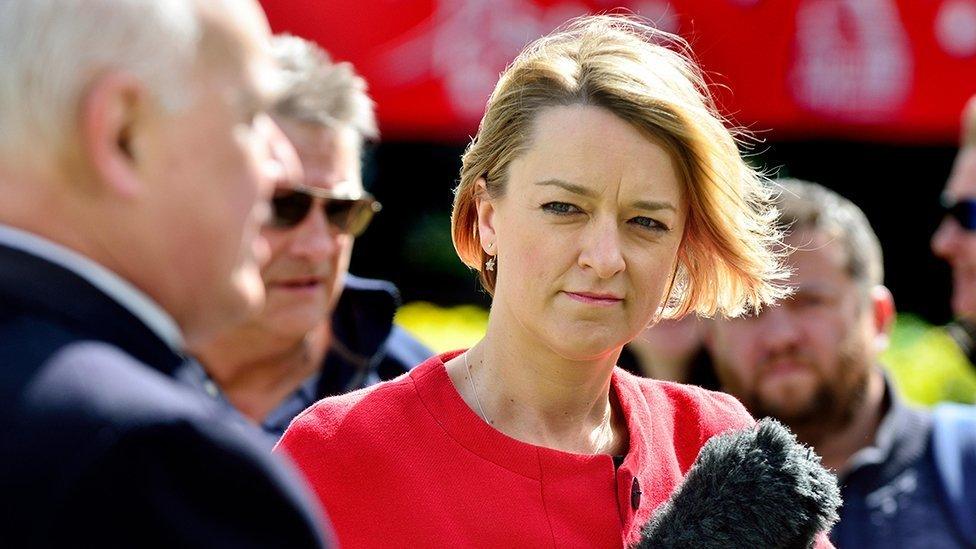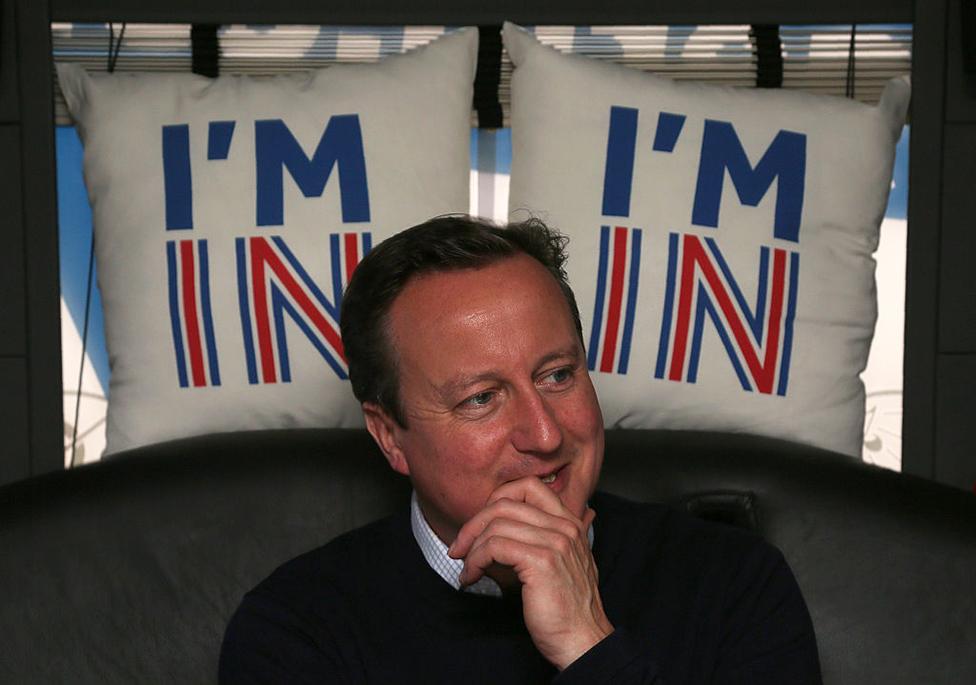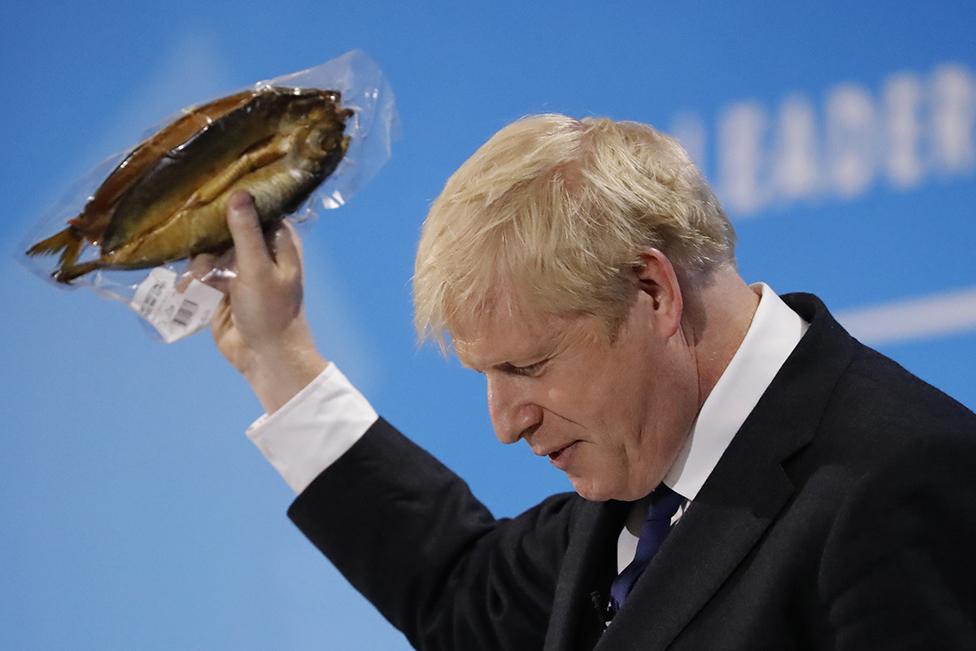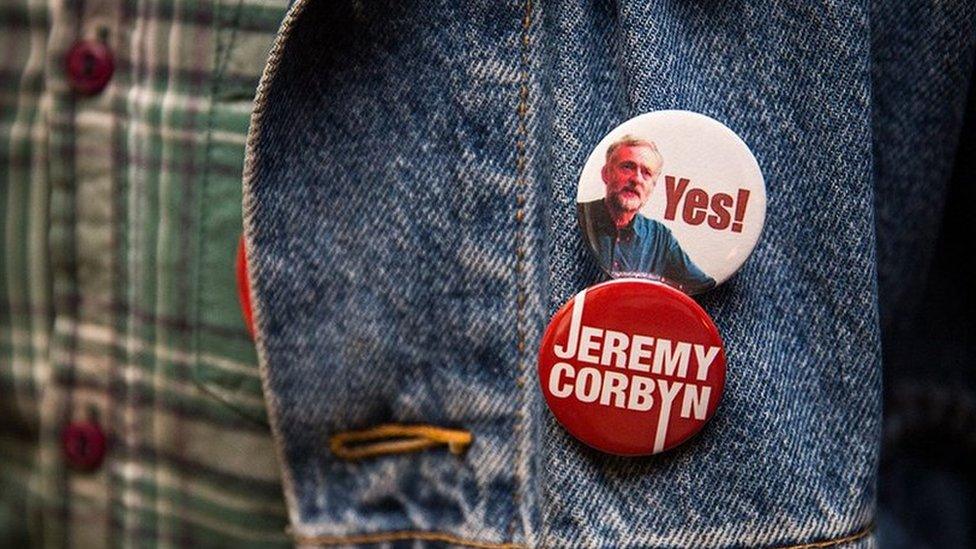Laura Kuenssberg: Signing off after seven dizzying years
- Published

Laura on College Green in 2017, shortly after a General Election was announced.
This won't be the last article I write, but it will be the last one in my job as the BBC's political editor. Before I move on, I've been trying to piece together some of the seismic events that have taken place - the Brexit referendum, the pandemic, Jeremy Corbyn's stormy leadership of the Labour Party, three different prime ministers.
It was an extraordinary period, and to help make sense of some of it, I've been comparing notes with five politicians, all of whom were, in one way or another, central to the political battles that went on.

"If you think that the people of this country are going to vote to hurt their wallets, you've got another think coming! It's never happened in 100 years, and it's not going to happen now!"
It was 2016 and I'd been the BBC's political editor for nearly a year. I had called one of the campaign chiefs at Remain HQ to to see how things were going. But rather than chatting about their plans for the crucial last few days, they launched into a tirade against their opponents.
They were bellowing loudly - furious, perhaps, because they had started to sense the vote slipping away from them. Tempers flare in politics. People care a lot about winning. They work all hours and get tired and cross. That hasn't changed in seven years. Normally, the next day it's forgotten.
But that angry, one-sided conversation stuck in my mind. A highly successful political operative just would not, and could not, believe that the British public might defy convention and vote against what most economic experts agreed even then was in their own, and the country's, financial interest.


Warnings of economic chaos had worked to secure David Cameron a majority in the 2015 election (although don't forget Labour's historic collapse in Scotland did its bit to send him to Number 10, too). But the referendum was different. It posed questions about identity, about the UK's place in the world. And the result showed conventional wisdom was for fools. It hadn't bargained on the Eurosceptics hunting out new voters, and using new ways to enthuse them.
I was what I was, and was outside the norm completely
Nigel Farage, the former UKIP leader who had campaigned so noisily to have the vote, looks back at how the Eurosceptic movement defied the odds and broke the establishment "rules".
He describes the referendum as an "insurgency". "I met lots of people who told me, 'I've never voted in my life', but expressed themselves in the EU vote," he recalls. In fact, nearly three million more people voted in the referendum than voted in the previous General Election. Farage's campaigning had always pitched him as something different, a politician proud of not fitting in. "I was what I was, and was outside the norm completely," he says.
Of course, courting controversy for political effect isn't new.
Farage describes how he went about it: "I had a deliberate technique. I'd say, right, I'm gonna go and say this at this press conference, I know exactly what the reaction is going to be. There'll be howls of indignation. There'll be demands that I apologise. And what I'll do tomorrow is double down."
He joked to me that Boris Johnson has partly stolen his technique. This was being willing to say publicly what, before 2015, might not have been acceptable in mainstream politics, to create arguments, to make political points, and to send messages to the public about who they are.
Cameron told ministers, ‘Campaign in what you believe is in the best interests of your country'
The Brexiteers knew the odds were against them in almost every traditional sense. And remember the official campaign, Vote Leave, wanted nothing to do with Farage's more controversial tactics. Yet they resolved that their route to victory would be to run a different kind of aggressive campaign, making statements they knew would also provoke, and deliberately targeting a blend of messages at voters who may never have cast a ballot before, or who had checked out of politics in the previous decade. They tried to attract voters for whom the economy had done no favours at all.
Andrea Leadsom was one of the serving Tory ministers who joined that campaign. She then made her way into the Cabinet, even running to become Prime Minister when Boris Johnson's campaign blew itself up.
"Out on the streets talking to people - they [would] say, 'Well I don't really want to admit it in public but yes, I'm going to vote to Leave,''' she tells me.
David Cameron's Remain campaign was more conventional than the Brexiteers', and when he did roam outside the norm and allowed members of his own team to push for Leave, it was arguably a political mistake.
"I distinctly remember David Cameron calling ministers in and saying to all of us: 'What you all have to do is campaign in what you believe is in the best interests of your country, not [in] what the party is telling you to do,'" says Leadsom. "And that was an extraordinary thing for him to do. And I think it spelt doom."

Prime Minister David Cameron on his campaign bus in 2016 on the final day of campaigning
The prime minister of the day suspended the normal rules by allowing his team to campaign against him. A referendum in itself is an unconventional thing in the UK. But, as the result indicated, convention itself had gone out the window.
The referendum came after what had also, on paper, seemed like a huge political upset.
Farage might not relish a comparison to the former Labour leader, Jeremy Corbyn - and Corbyn won't be too happy with it, either. But they have something in common - straying deliberately from the norm. In 2015, the long-serving left winger had already prospered by courting new or disaffected voters, and claiming the mantle of the outsider for himself.
So, along comes Jeremy Corbyn [and says] I'll tell you why the system doesn't work
The chair of his campaign for the Labour leadership was John McDonnell, who became the shadow chancellor. McDonnell says his comrade's portrayal of being beyond the norm, "was a huge attraction".
"Remember, after five years of austerity people had had it bad enough. They weren't just questioning what was happening day-to-day, they were questioning the whole system. So along comes Jeremy Corbyn [and says] actually, I'll tell you why the system doesn't work."
Jeremy Corbyn's campaign forged a different coalition - there were the thousands upon thousands of new voters who joined the party for the first time, and those on the left of the party who felt it had drifted too far from its soul.
McDonnell says they consciously decided to pursue victory in novel ways.
"Beyond the normal party politics out there, were a whole range of social movements - the anti-war movement, the people campaigning against austerity and cuts. And we basically said, 'Look, we can win this election if we invite those [groups] into a discussion around more formal politics and getting them to vote as well.' And that's what we did."
And throughout his time, during his struggle to establish control over the Labour Party, he continued to delight many of his supporters, and irritate many others in the Labour movement by refusing to conform.

Boris Johnson holds up a kipper at the final Conservative Party leadership election hustings in 2019
Which brings us to the politician who turned a love for pushing convention, into a ticket to Number 10. Boris Johnson is a career politician - just like Corbyn and Farage - although, like them, he would argue otherwise. To claim Johnson is not a member of the elites he has derided, is to ignore the facts. Yet, as someone who has - both as a columnist, and a politician - tried to write his own headlines, the prime minister has got to the top with a technique of saying and sometimes doing what others dare not do.
His backers say it's because he's being authentic. I remember a conversation with a voter in Middlesbrough during the 2019 election campaign who said: "I like Boris because he's just like me. He likes beer, he likes women, and he makes mistakes." Whatever your view on whether those are qualifications for high office, there's no doubt that Johnson's willingness to be blunt, to be prepared to offend, and yes, to break the rules, has been seen by many voters as a welcome refreshment from smooth, technocratic politicians I've been told so often are "all the same".
One senior minister still now finds Johnson's apparent need to provoke, to bluster, frustrating. "It's just not funny anymore," they say. But the provocateur is the one in power. It's not remotely clear if the new voting coalition that Boris Johnson built on the foundation of the Brexit vote will see him stay in office for the second term he craves. Yet his huge political personality makes it hard for others to find space to breathe.
David and Theresa had a basic respect for truth and civilised debate, which I don't think we have in the current incumbent
That trend of convention-busting worries others, though. Nicola Sturgeon, the First Minister of Scotland, is one of the tiny number of politicians who was at the top of her game at the start of this era, and who is still there.
"I think some of the conventions have been smashed to bits," she tells me. "And I think the rules of engagement have undoubtedly changed." The first minister, who is no fan of Boris Johnson, continues: "I've had deep differences, obviously, with both David Cameron and Theresa May. But, you know, I reflect back on dealing with them and they had a respect for the office. I think they had a basic respect for truth and civilised debate, which I'm sorry to say, I don't think we have in the current incumbent."
During our conversation, Sturgeon also reflects on how politicians have been challenged during this era in ways that they could simply never have dreamt of. During the pandemic their choices influenced all of us in ways they hadn't for generations. Their decisions were matters of life and death.
She recalls a sense of dread. "Around about six o'clock, on a Friday evening, the streets were deserted and I was passing pub after pub. [They were] closing their doors and pulling the shutters down. It was incredible, just such an eerie, unsettling feeling. And I think the thing that was most difficult as a leader to come to terms with was that there were no decisions you could take that wouldn't have caused harm in some way. There were no decisions you could take that would just magically make everything better."
The one extraordinary point of stability throughout this whole period is that the Conservatives have been in office
Matt Hancock, who was health secretary during the pandemic, reflects on his toughest moments, from that time. One, he says, was the intense worry during the second lockdown in January 2021 when case numbers were rising even after ministers had taken drastic action.
"They just kept going up, and the numbers in hospital kept going up. When we hit 40,000… well, that's almost half of all the beds in hospitals. So that was the hardest period because you knew there was nothing more you could do. And if it didn't turn, it would have been truly, truly, truly awful, as opposed to just awful."
And the pandemic came hard on the heels of the most intense period of political change we've lived through for a long time. It's turmoil, Matt Hancock tells me is documented on his walls.
"I've got on my wall pictures of four different cabinets that I was in - the David Cameron coalition cabinet, the Cameron post 2015 majority government cabinet, the Theresa May cabinet and the Boris Johnson cabinet. And there's hardly any people who are in all four."
In the end, of course, he suffered his own embarrassing exit.

One of the topics that all of the five that I've been speaking to about the past few years is the impact technological change has had on politics.
John McDonnell talked about how new campaign methods played a central part to crowning Jeremy Corbyn as leader.
"We had all these young people flood into the campaign, with ideas and techniques I'd never even heard of. And it was all social media," he says. "They knew how to target games, [so] we set up a group called 'games for the many'. And they invented games that people could play that would lead them into a political debate and support for Jeremy."

A supporter of Jeremy Corbyn attends a launch of policy ideas for young people in 2015
Politics online has changed how debates are conducted in the House of Commons, too. And that's not just because you see so many MPs with heads bowed, staring at their phones. Nowadays, speeches aren't just designed for TV sound bites, but sometimes for the snippet for social media, in the hope it will go viral. Andrea Leadsom jokes about the weekly face-offs between Jeremy Corbyn and Theresa May: "I always felt... she might say, you know, happy birthday, Jeremy. And he'd be like, that's not good enough!... if you were there, it made no sense. But it was clearly a script that was designed for social media."
Nigel Farage admits that without technology he would never have been able to build his profile, to have the profound effect that he has had on our politics. "I wouldn't have been a household name without YouTube," he jokes.
As Nicola Sturgeon quipped, it's quicker to list what hasn't changed in the past seven years, than what has.
Technology has allowed toxicity to spread more easily into our debates. The country made a big constitutional decision that stunned the political establishment, but the effects of which are yet to be fully understood. Rule breakers have prospered, for now, and stability has gone out of fashion.
The one lesson to take from a dizzying time, perhaps, is that relying on conventional wisdom is a fool's game. A heartfelt thank you for following the extraordinary events of the past seven years along with me. And there'll be more to come, from a different chair, in a few months' time.
